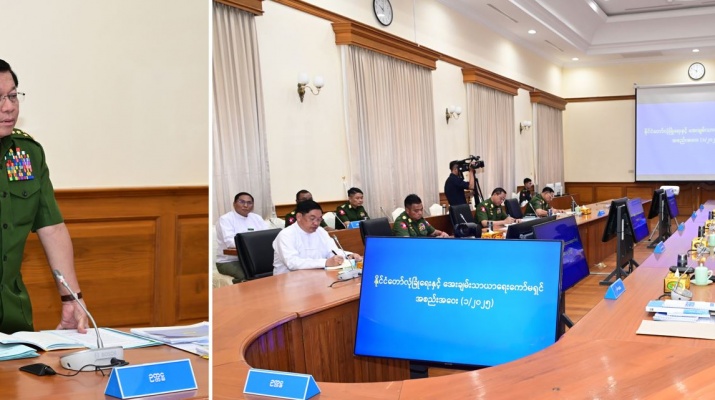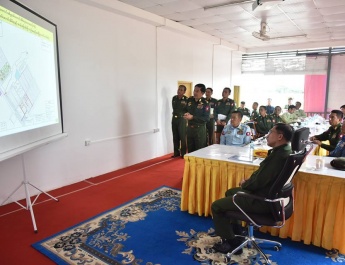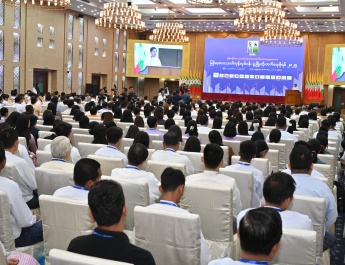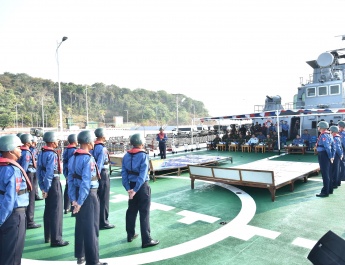Improve the country’s image by ensuring the best means for the election and strengthen the political path
Nay Pyi Taw August 12
The State Security and Peace Commis-sion held a meeting this morning, with an address delivered by Chairman of State Security and Peace Commission of the Republic of the Union of Myanmar Senior General Min Aung Hlaing.
Also present were Vice Chairman of State Security and Peace Commission Vice-Senior General Soe Win, Commis-sion member Prime Minister U Nyo Saw, Commission member Executive Chief U Aung Lin Dway, Commission Secre-tary Joint Executive Chief General Ye Win Oo, Commission members General Maung Maung Aye, Lt-Gen Tun Tun Naung, U Than Swe, Lt-Gen Yar Pyae, and General Kyaw Swa Lin.
In his keynote address, the Senior General said as for providing necessary guidance and effective coordination for the national defence, security and peace and successful holding of the multi-party democracy general election, the National Defence and Security Council set up and assigned the SSPC. The current goal of SSPC is the success of the multi-party democracy general election, convening of the parliament after the election and paving the way for the elected govern-ment to shoulder the State duties. The election will be held without fail. The task of enumerating the 2024 census, included in the preparations for correctness of voter list, has achieved success to a certain degree. As for the success of the election, the Election Commission was reformed and constituency-wise data and area-wise security data were collected.
The election will be held to convene the hluttaws at all levels. The Hluttaw will entrust the President, Vice-President and executive bodies and the Union level organizations assigned by the President with their relevant responsibilities, and finally, to assign the government. The successful holding of the election as per the law is of vital importance.
The Election Law of Myanmar does not define the percentage of the voters required for the success of an election, and according to the studies other countries do the same. If the voter population exceeds 50 percent, it can be determined that the election includes the majority wish. Endeavours will be made for holding an honorable and successful election. In the global arena, voter turnout of the elections of certain countries may be lower than 50 percent, but the figure exceeds 50 percent in the elections of most countries.
Regarding the quorum for a parliamentary session, the Section 85 of the Constitution says, “The first day session of the Pyidaungsu Hluttaw shall be valid if more than half of the total number, who have the right to attend the session, is present. The valid sessions that are extended shall be valid if at least one-third of the Hluttaw representatives are present.” As for the attendance of a parliamentary session to reach 50 percent, the election will be held in all possible townships. Measures will be taken for all eligible voters to cast votes. An advanced voting system will be arranged for the displaced persons of the natural disaster-hit areas, and voting rights of the persons who are in the safe places will be ensured.
Measures will be taken for the political parties to launch canvassing campaigns during the election period. Parties should have the right to open offices and all eligible persons should also have the right to join their chosen party. The relevant organizations must conduct careful checks to prevent the occurrence of the extra number of party members through overlaps.
It is necessary to systematically supervise the qualifications of Hluttaw candidate representatives. As candidates conduct campaign activities, their security must be arranged and ensured by themselves. Moreover, within the specified timeframe, security guarantees must be provided to ensure that voting can be conducted safely according to the respective townships.
There may be individuals and groups, both domestic and foreign, who attempt to sabotage the successful conduct of the election. They may use various methods to undermine the election’s success. Similarly, among foreign countries, some may support and welcome the holding of a multi-party democratic general election in Myanmar, while others may take a critical stance toward it. Therefore, the upcoming election must be conducted as a free and fair election, free from any immorality. To prevent any fraud, Myanmar electronic voting machines have been fully funded and implemented, ensuring that no form of misconduct can occur. Furthermore, necessary protection measures must be provided to political party members and candidate representatives participating in the election so that they can safely
carry out their activities from the campaigning period through to the voting period.
Regarding the allegations and killings labeling government staff and the public as “informants,” such incidents may increase during the election period, so effective prevention and protective measures need to be implemented. Those who commit such acts must be collectively identified and exposed, and the judicial sector must expedite their prosecution. Since these are not ordinary cases but offenses that threaten the security of government staff and the public, swift and effective legal action is necessary.
According to current records, there are over seven million students attending schools nationwide. Among the schools that were open last year, some are unable to open this year, while some schools that could not open last year are able to open this year. It is necessary to focus on ensuring that schools currently operating are not closed unnecessarily due to natural disasters or other avoid-able reasons. As the saying goes, “Let us ensure education sector for the development of the Nation,” education is very important for the country. A review of the schedules for the 2024-2025 and 2025-2026 academic years shows that all regions and states are experiencing insufficient student enrolment and weak grade promotion rates. Therefore, the relevant ministries need to conduct research and seek solutions to address the decline in education quality. The commission also emphasizes the need to prioritize improving education quality going forward.
Recently, there have been arrests related to illegal trade in border areas. Suppressing and preventing illegal trade will help uphold the rule of law and reduce armed terrorists. Armed terrorists in border regions use the profits collected from illegal trade to strengthen their forces, which undermines national stability and the rule of law. Therefore, all must effectively combat illegal trade to promote peace, stability, and the rule of law. Those responsible for exposing and preventing illegal trade must carry out their duties systematically and diligently with loyalty to the nation. Looking back at the country’s history, illegal trade routes have caused economic damage. Valuable national resources have been smuggled out through clandestine channels, and illegal goods smuggled in, preventing economic growth. In line with the motto “Let us encourage production for prosperity of the Nation,” only with produc-tive industries can the national economy remain strong. Hence, efforts to promote production activities must continue.
Presentation by Relevant Sectors
Subsequently, the Commission Secre-tary Joint Executive Chief presented an assessment of the feasibility of conducting multi-party democratic general elections in phases across regions and states at the township level, the distribu-tion and usability of Myanmar Electronic Voting Machines (MEVMs), and matters related to security arrangements. The Commission Member Union Minister for Home Affairs provided comparative data on security and rule of law over the years, the establishment of public security and counter-terrorism units, and measures to enhance security to ensure the successful conduct of the elections. The Commission Member Chief of General Staff (Army, Navy and Air) discussed ongoing military operations and security activities in collaboration with regional military commands, efforts to strengthen territorial control to expand election activities at the township level, and plans for further implementation. The Commission Member Union Minister for Foreign Affairs outlined arrangements for enabling overseas voters to cast advance votes, noting that, based on election-related studies, out of 193 UN member states, 123 countries do not have provisions for advance voting, while 70 countries have adopted advance voting systems. Of these 70, 54 countries allow both domestic and overseas advance voting, while 16 permit only domestic advance voting. Furthermore, only 15 countries allow all voters to cast advance votes freely, while 55 countries specify particular categories of voters eligible for advance voting.
The Commission Vice Chairman presented details on the activities of opposing organizations and Ethnic Armed Organizations (EAOs) across regions and states, progress in military operations and security measures, and efforts by the military, public security, counter-terrorism units, and people’s militia to combat drug trafficking, illegal smuggling, and other illicit activities.
General Discussion
Subsequently, Commission Member Prime Minister U Nyo Saw discussed the preparations by government ministries to ensure the successful conduct of the elections, as well as efforts to enhance public education. Commission Member Executive Chief U Aung Lin Dway reported on the transportation of MEVMs and the implementation of election laws and procedures. Commission Member Union Minister for Defence General Maung Maung Aye highlighted media efforts to raise public awareness about the use of MEVMs, emphasizing the need to encourage all eligible voters to participate and ensure the elections’ success to advance the multi-party democratic system desired by the public.
Supplementary Instructions
Regarding the presentations, the Senior General instructed on the need to expand the number of townships where elections can be held, address military and security-related matters, implement phased elections, and arrange for the use of MEVMs. The Ministry of Home Affairs was directed to enhance security for political party personnel, party offices, and wards, as well as to ensure the competence of police force members. The Tatmadaw was tasked with supporting media campaigns and public education efforts to ensure the elections’ success, while those who support democracy were urged to promote and support efforts to achieve a successful election outcome.
In the concluding remarks, the Senior General emphasized the priority of successfully conducting multi-party democratic elections. He noted that individuals and organizations opposing national stability and development might engage in disruptive acts or attacks to undermine the elections. Such actions could involve drug trafficking, online gambling, and other indirect attacks that could affect national and regional security. He stressed the importance of intensifying efforts to combat drug trafficking and effectively address online financial fraud, ensuring legal action based on thorough intelligence gathering. Security authorities, in collaboration with local administrative bodies and the public, were directed to decisively address these issues.
The commission, established to provide guidance and coordination for national defence, security, peace, and the successful conduct of multi-party democratic elections, urged all members to work tirelessly to ensure the success of these objectives. The meeting came to a conclusion.





